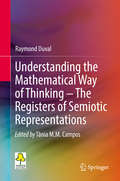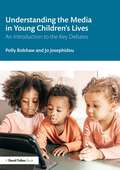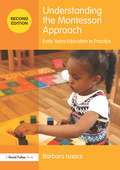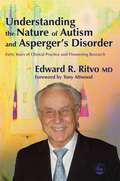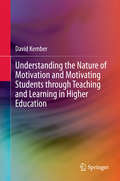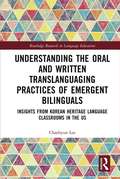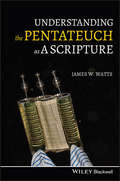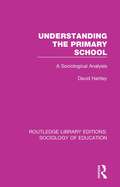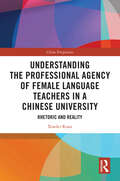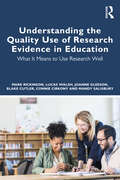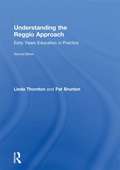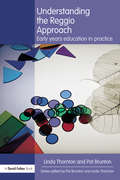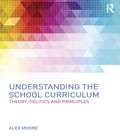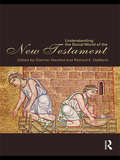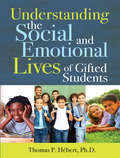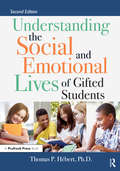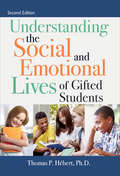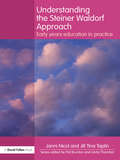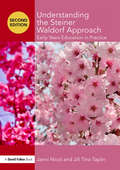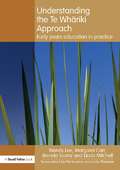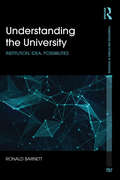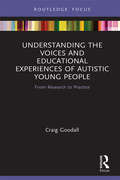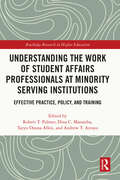- Table View
- List View
Understanding the Mathematical Way of Thinking – The Registers of Semiotic Representations
by Raymond DuvalIn this book, Raymond Duval shows how his theory of registers of semiotic representation can be used as a tool to analyze the cognitive processes through which students develop mathematical thinking. To Duval, the analysis of mathematical knowledge is in its essence the analysis of the cognitive synergy between different kinds of semiotic representation registers, because the mathematical way of thinking and working is based on transformations of semiotic representations into others. Based on this assumption, he proposes the use of semiotics to identify and develop the specific cognitive processes required to the acquisition of mathematical knowledge. In this volume he presents a method to do so, addressing the following questions:• How to situate the registers of representation regarding the other semiotic “theories” • Why use a semio-cognitive analysis of the mathematical activity to teach mathematics • How to distinguish the different types of registers • How to organize learning tasks and activities which take into account the registers of representation • How to make an analysis of the students’ production in terms of registersBuilding upon the contributions he first presented in his classic book Sémiosis et pensée humaine, in this volume Duval focuses less on theoretical issues and more on how his theory can be used both as a tool for analysis and a working method to help mathematics teachers apply semiotics to their everyday work. He also dedicates a complete chapter to show how his theory can be applied as a new strategy to teach geometry.“Understanding the Mathematical Way of Thinking – The Registers of Semiotic Representations is an essential work for mathematics educators and mathematics teachers who look for an introduction to Raymond Duval’s cognitive theory of semiotic registers of representation, making it possible for them to see and teach mathematics with fresh eyes.”Professor Tânia M. M. Campos, PHD.
Understanding the Media in Young Children’s Lives: An Introduction to the Key Debates
by Polly Bolshaw Jo JosephidouThis book explores the impact of digital media on young children’s lives and the role that the media and news industries play in the social construction of childhood. It highlights the pressing issues relating to young children’s media use drawing on key research and examines the impact of digital media on their learning, development and socialization. The chapters recognise the challenges digital media presents children and families, but also demonstrate how media use and engagement can have a positive impact on children’s academic attainment, social capital and opportunities to create and curate online content. Covering key areas of concern such as safety, violence and children’s mental health, the authors provide strategies to help children and families reduce the risks that can arise with digital media use and capitalise on the opportunities it can offer. Including case study examples and opportunities for reflective practice, this is an essential text for students on Childhood and Early Childhood Studies courses and Early Years Foundation Degrees as well as practitioners wanting to develop their critical understanding of the role of the media in young children’s lives.
Understanding the Montessori Approach: Early Years Education in Practice (Understanding the… Approach)
by Barbara IsaacsUnderstanding the Montessori Approach is a much-needed source of information for those wishing to extend and consolidate their understanding of the Montessori Approach and how it is used in the teaching and learning of young children. The book will enable the reader to analyse the essential elements of this Approach to early childhood and and its relationship to quality early years practice. This second edition has been fully updated to reflect changes in the Early Years Foundation Stage and includes a fresh examination of the relationship between technology and the Montessori approach, as well as a brand new chapter, Learning in Montessori Settings. Exploring all areas of the curriculum including the organisation of Montessori schools, the environment, learning and teaching and the outcomes for children, this book: examines the historical context of the Montessori approach and its relevance to modern-day education; explores Montessori's views of child development and the role of the learning environment in a child’s educational development; details the organisation of Montessori schools worldwide and the structure of a typical day in a Montessori setting; highlights the principles of Montessori pedagogy, including the tools and strategies employed by its practitioners; considers how and what children learn in a Montessori setting and the links with EYFS 2017; includes new benefits and challenges of the Montessori approach to children's lives. Understanding the Montessori Approach provides an accessible overview of this major pedagogical influence on early years practice, supported by case studies, examples, summaries and reflective practice questions. This new edition not only highlights the core ideas that practitioners should consider when reviewing and reflecting on their own practice, but accomodates revisions to educational curriculum and policy in order to serve as an invaluable resource for students and practitioners alike.
Understanding the Nature of Autism and Asperger's Disorder: Forty Years of Clinical Practice and Pioneering Research
by Anthony Attwood Edward R RitvoEdward R. Ritvo md is an internationally recognized medical expert, researcher and pioneer in the field of autism and Asperger's disorder and co-author of the official diagnostic criteria in the DSM (Diagnostic and Statistical Manual of Mental Disorders). Much of what is known about these disorders today is based on his painstaking research and groundbreaking discoveries. In this book he shares his forty years' experience and opens his extensive UCLA casebook to the reader. Understanding the Nature of Autism and Asperger's Disorder is 'a consultation with Prof. Ritvo' - a thoroughly accessible introduction for professionals, families, spouses and individuals with autism and Asperger's Disorder. Prof. Ritvo traces the historical development of understanding about autism and Asperger's Disorder, from the centuries of misdiagnoses and the first recognition of the characteristics of the disorders to his own highly-regarded methods for making a diagnosis. Drawing on case histories from forty years' of clinical practice, he explains their basic nature, what the causes are, what is different in the brain, treatments that work (and those that don't), what a child with a diagnosis might be like when he or she grows up, and what future research may hold. This book will be an absolute must-read for anyone with an interest in autism and Asperger's Disorder, whether a practitioner, a parent, a student, or an affected individual.
Understanding the Nature of Motivation and Motivating Students through Teaching and Learning in Higher Education
by David KemberThis book is based upon three interrelated open naturalistic studies conducted to better characterise the motivational orientation of students in higher education. Open semi-structured individual interviews were conducted with undergraduates, students at community colleges and students in taught postgraduate courses in Hong Kong. The analysis used an exploratory grounded theory approach and resulted in a motivational orientation framework with six continua with positive and negative poles. On enrolment students had positions on the six facets of motivation, which shifted as they progressed through their degree according to their perceptions of the teaching and learning environment. The framework can, therefore, be used to explain both initial decisions to enrol and motivation to continue studying. The interviews included descriptions of teaching approaches and learning activities and their effects on motivation. This made it possible to describe a teaching and learning environment conducive to motivation, with eight supportive conditions. Each facet of the teaching and learning environment is illustrated with quotations from the three groups of students, resulting in a guide to configuring a teaching and learning environment conducive to motivating students. The emerging community-college sector in Hong Kong is used as a case study of the effects on student motivation of the expansion of the higher education sector through private colleges. Cultural issues are discussed, particularly the performance of Asian students relative to those in the West.
Understanding the Oral and Written Translanguaging Practices of Emergent Bilinguals: Insights from Korean Heritage Language Classrooms in the US (Routledge Research in Language Education)
by Chaehyun LeeDetailing qualitative research undertaken with elementary-grade children in a Korean heritage language school in the US, this text provides unique insight into the translanguaging practices and preferences of young, emergent bilinguals in a minority language group. Understanding the Oral and Written Translanguaging Practices of Emergent Bilinguals examines the role of socio-cultural influences on emergent bilinguals’ language use and development. Particular attention is paid to the role of immigrant parental involvement and engagement in their bilingual children’s language learning and academic performance. Presenting data from classroom audio recordings, writing, and drawing samples, as well as semi-structured interviews with children and parents, the book identifies important implications for the education of emergent bilinguals to better support their overall language and literacy development. This text will primarily be of interest to doctoral students, researchers, and scholars with an interest in bilingual education, biliteracy, and early literacy development more broadly. Those interested in applied linguistics, the Korean language, and multicultural education will also benefit from this volume.
Understanding the Pentateuch as a Scripture
by James W. WattsA cutting-edge scholarly review of how the Pentateuch functions as a scripture, and how it came to be ritualized in this way. Understanding the Pentateuch as a Scripture is a unique account of the first five books of the Bible, describing how Jews and Christians ritualize the Pentateuch as a scripture by interpreting it, by performing its text and contents, and by venerating the physical scroll and book. Pentateuchal studies are known for intense focus on questions of how and when the first five books of the Bible were composed, edited, and canonized as scripture. Rather than such purely historical, literary, or theological approaches, Hebrew Bible scholar James W. Watts organizes this description of the Pentateuch from the perspectives of comparative scriptures and religious studies. He describes how the Pentateuch has been used in the centuries since it began to function as a scripture in the time of Ezra, and the origins of its ritualization before that time. The book: Analyzes the semantic contents of the Pentateuch as oral rhetoric that takes the form of stories followed by lists of laws and sanctions Gives equal space to its ritualization in the iconic and performative dimensions as to its semantic interpretation Fully integrates the cultural history of the Pentateuch and Bible with its influence on Jewish and Christian ritual, and in art, music, theatre, and film Understanding the Pentateuch as a Scripture is a groundbreaking work that highlights new research data and organizes the material to focus attention on the Pentateuch’s—and Bible’s— function as a scripture.
Understanding the Primary School: A Sociological Analysis (Routledge Library Editions: Sociology of Education #29)
by David HartleyIn this study, first published in 1985, the author explores the construction of educational ideologies and assesses to what extent they are put into practice by the teachers. He examines the ‘politics’ of education within the school; the extent to which the head teacher, as the bureaucratic authority in the school, seeks to impose his or her own views and the degree to which teachers see themselves as possessing professional autonomy. The study also pays attention to status differentiation within the education of the working class and explores the educational consequences of ethnic and gender status group membership. This title will be of interest to sociology and education.
Understanding the Professional Agency of Female Language Teachers in a Chinese University: Rhetoric and Reality (China Perspectives)
by Xiaolei RuanCentering on a qualitative study of three female English teachers in Shanghai, China, the book explores female language teachers' perceived discrepancies and agency exercised in their teaching, research and teacher learning practices. By adopting multiple research methods, such as narrative questionnaire, metaphor, timeline, interview and classroom observation, this study reveals that female language teachers’ agency is a dynamic entity manifested in the ongoing negotiation of agency belief, agency practice, and agency inclination, as well as the interaction of individual and the environment. Though there are certain limitations concerning representativeness and generalizability, the author provides a thick description of how female language teachers in China are exercising agency to fulfill their career development, which offers insightful suggestions to language education in both China and broader areas globally. The book will appeal to researchers studying teacher education and foreign (English) language teaching, university teachers, especially female foreign language teachers, PhD students and graduate students, as well as career women.
Understanding the Quality Use of Research Evidence in Education: What It Means to Use Research Well
by Mark Rickinson Lucas Walsh Joanne Gleeson Blake Cutler Connie Cirkony Mandy SalisburyThis book focuses on the question of how to understand quality use of research evidence in education, or what it means to use research evidence well. Internationally there are widespread efforts to increase the use of research evidence within educational policy and practice. Such efforts raise important questions about how we understand not just the quality of evidence, but also the quality of its use. To date, there has been wide-ranging debate about the former, but very little dialogue about the latter. Based on a five-year study with schools and school systems in Australia, this book sheds new light on: why clarity about quality of use is critical to educational improvement; how quality use of research evidence can be framed in education; what using research well involves and looks like in practice; what quality research use means for individuals, organisations and systems; and what aspects of using research well still need to be better understood. This book will be an invaluable resource for professionals within and beyond education who want to better understand what using research evidence well means and involves and how it can be supported.
Understanding the Reggio Approach: Early Years Education in Practice
by Pat Brunton Linda Thornton‘Linda Thornton and Pat Brunton have been immersed in the field for many years and write authoritatively, with understanding and clarity. The book is thoroughly up to date and offers a useful reference source. This book is very welcome, it is accessible, readable and sound.’ (Review of the first edition in ReFocus, Journal of the UK Reggio Network, Summer 2005) Understanding the Reggio Approach is a much needed source of information for those wishing to extend and consolidate their understanding of the Reggio Approach. Analysing the essential elements of the Reggio Approach to early childhood and its relationship to quality early years practice, this new edition is fully updated with the latest developments, including references to the Early Years Foundation Stage and a brand new chapter focusing on creativity. This book: Describes the key features of the Reggio Approach to early childhood and provides examples from infant-toddler centres and preschools in Reggio Emilia Provides students and practitioners with the relevant information about a key pedagogical influence on high quality early years practice in the EYFS Highlights the key ideas that practitioners should consider when reviewing and reflecting on their own practice Can be used as the basis for continuing professional development and action research Written to support the work of all those in the field of early education and childcare, this is a vital text for students, early years and childcare practitioners, teachers, Early Years Professionals, Children’s Centre professionals, lecturers, advisory teachers and setting managers.
Understanding the Reggio Approach: Early years education in practice (Understanding the… Approach)
by Pat Brunton Linda ThorntonUnderstanding the Reggio Approach is a much needed source of information for those wishing to extend and consolidate their understanding of the Reggio Approach. It enables analysis of the essential elements of this particular approach to early childhood teaching and the relationship it holds with quality early years practice. It describes the key features of the Reggio Approach to early childhood including the environment, creativity, relationships and documentation. This new edition has been updated with the latest developments in this approach and includes new material on the thinking and work of Loris Malaguzzi and the future for educators in Reggio Emilia and the implications for practice in the UK. Features include: Examples from infant-toddler centres and preschools in Reggio Emilia. Key points to highlight the ideas that practitioners should consider when reviewing and reflecting on their practice Reflections that can be used as the basis for continuing professional development and action research. Written to support the work of all those in the field of early education and childcare, this is a vital text for students, early years and childcare practitioners, teachers, Early Years Professionals, Children’s Centre professionals, lecturers, advisory teachers and setting managers.
Understanding the School Curriculum: Theory, politics and principles
by Alex MooreAt a time of rapid social change and numerous policy initiatives, there is a need to question the nature and function of school curricula and the purposes of formal public education. Comparing curriculum developments around the globe, Understanding the School Curriculum draws on a range of educational, philosophical and sociological theories to examine the question ‘What is a curriculum for?’ In considering different answers to this fundamental question, it explores a range of topical issues and debates, including: tensions and dynamics within curriculum policy The implications of uncertainty and rapid social change for curriculum development the positive and negative influence of free market ideologies on public education the impact of globalization and digital technologies arguments for and against common core curricula and state control It examines the possibility of a school curriculum that is not shaped and monitored by dominant interests but that has as its founding principles the promotion of responsibility, responsiveness, a love of learning, and a sense of wonder and respect for the natural and social world. Understanding the School Curriculum is for all students following undergraduate and Masters courses in curriculum, public policy and education-related subjects. It is also for all training and practising teachers who wish to combine a deeper understanding of major curriculum issues with a critical understanding of the ways in which ideologies impact on formal state education, and to consider ways of producing school curricula that are appropriate to the times we live in.
Understanding the Scriptures: A Complete Course on Bible Study (Revised First Edition)
by Scott Hahn James SociasThis book by Dr. Scott Hahn presents a Catholic approach to Scripture, highlighting the theme of covenant. Tracing a path through salvation history, the book explains the various books of the Bible and the importance of each event in salvation history. Understanding the Scriptures will provide an understanding of Sacred Scripture so critical to the Catholic Faith.
Understanding the Social World of the New Testament
by Dietmar Neufeld Richard E. DeMarisThe New Testament is a book of great significance in Western culture yet is often inaccessible to students because the modern world differs so significantly from the ancient Mediterranean one in which it was written. It is imperative to develop a cross-cultural understanding of the values of the ancient Mediterranean society from which the New Testament arose in order to fully appreciate the documents and the communities that they represent. Dietmar Neufeld and Richard E. DeMaris bring together biblical scholars with expertise in the social sciences to develop interpretative models for understanding such values as collectivism, kinship, memory, ethnicity, and honour, and to demonstrate how to apply these models to the New Testament texts. Kinship is illuminated by analysis of the Holy Family as well as to early Christian organisations; gender through a study of Paul’s view of women; and landscape and spatiality through a discussion of Jesus of Nazareth. This book is the ideal companion to study of the New Testament.
Understanding the Social and Emotional Lives of Gifted Students
by Thomas P. HébertUnderstanding the Social and Emotional Lives of Gifted Students presents a comprehensive treatment of social and emotional development in high-ability learners. The author, a nationally recognized leader in gifted education, discusses theories that guide our examination of the lived experiences of gifted students; social and emotional characteristics and behaviors evidenced in gifted learners; friendships and family relationships that support them; contextual influences that shape their social and emotional lives; and identity development. Moreover, the author examines the complexity of these issues with gifted underachievers, gifted culturally diverse students, and twice-exceptional students. In addition, the book offers a plan for designing a gifted-friendly classroom environment for social and emotional development and a comprehensive collection of resources to support professionals in gifted education research and practice.
Understanding the Social and Emotional Lives of Gifted Students
by Thomas P. HébertThe second edition of Understanding the Social and Emotional Lives of Gifted Students presents a comprehensive treatment of social and emotional development in high-ability learners. This text:Discusses theories that guide the examination of the lived experiences of gifted students.Features new topics, such as cyberbullying and microaggressions. Covers social and emotional characteristics and behaviors evidenced in gifted learners.Includes considerations for gifted underachievers, gifted culturally diverse students, twice-exceptional students, LGBTQ gifted students, and young people from low-income backgrounds.Describes gifted students' friendships and family relationships that support them, contextual influences that shape their social and emotional lives, and identity development.The author provides a wealth of field-tested strategies for addressing social and emotional development. In addition, the book offers a plan for designing a gifted-friendly classroom environment to support the social and emotional well-being of gifted students and a comprehensive collection of resources to support professionals in gifted education research and practice.
Understanding the Social and Emotional Lives of Gifted Students, 2nd ed.
by Thomas HebertThe second edition of Understanding the Social and Emotional Lives of Gifted Students presents a comprehensive treatment of social and emotional development in high-ability learners. This text:Discusses theories that guide the examination of the lived experiences of gifted students.Features new topics, such as cyberbullying and microagressions. Covers social and emotional characteristics and behaviors evidenced in gifted learners.Includes considerations for gifted underachievers, gifted culturally diverse students, twice-exceptional students, GLBTQ gifted students, and young people from low-income backgrounds.Describes gifted students friendships and family relationships that support them, contextual influences that shape their social and emotional lives, and identity development.The author provides a wealth of field-tested strategies for addressing social and emotional development. In addition, the book offers a plan for designing a gifted-friendly classroom environment to support the social and emotional well-being of gifted students and a comprehensive collection of resources to support professionals in gifted education research and practice.
Understanding the Steiner Waldorf Approach: Early Years Education in Practice
by Janni Nicol Jill Tina TaplinUnderstanding the Steiner Waldorf Approach?is a much needed source of information for those wishing to extend and consolidate their understanding of the Steiner Waldorf High Scope Approach. It will enable the reader to analyse the essential elements of the Steiner Waldorf Approach to early childhood and its relationship to quality early years practice. Exploring all areas of the curriculum including observation and assessment, child development, play, repetition and the environment, this book: describes the key principles of the Steiner Waldorf approach to early childhood with examples from Steiner settings; provides students and practitioners with the relevant information about a key pedagogical influence on high quality early years practice in the United Kingdom; highlights the key ideas that practitioners should consider when reviewing and reflecting on their own practice; can be used as the basis for continuing professional development and action research Written to support the work of all those in the field of early years education and childcare, this is a vital text for students, early years and childcare practitioners, teachers, early years professionals, children’s centre professionals, lecturers, advisory teachers, head teachers and setting managers.
Understanding the Steiner Waldorf Approach: Early Years Education in Practice (Understanding the… Approach)
by Janni Nicol Jill Tina TaplinThis fully revised edition of Understanding the Steiner Waldorf Approach is a much needed source of information for those wishing to extend and consolidate their understanding of the Steiner Waldorf early childhood approach. It enables the reader to analyse the essential elements of the Steiner Waldorf Approach to early childhood and its relationship to quality early years practice. Covering all areas of the curriculum including observation and assessment, child development, play, repetition and the environment, this new edition has been updated to reflect recent curriculum changes and explore the influence of media and technology. Including a new chapter on expanding the Steiner Waldorf approach to work with children from birth to three, the book: describes the key principles of the Steiner Waldorf approach to early childhood with examples from Steiner settings; provides an accessible and objective overview of a key pedagogical influence on high quality early years practice in the United Kingdom; highlights the key ideas that practitioners should consider when reviewing their own practice; contains summaries of key points and reflective practice questions to help students and practitioners engage with the ideas in the book. can be used as the basis for continuing professional development and action research. Written to support the work of all those in the field of early years education and childcare, this text is essential reading for students, practitioners, leaders, managers and all those wanting to improve their early years practice.
Understanding the Te Whariki Approach: Early years education in practice (Understanding the… Approach)
by Wendy Lee Margaret Carr Brenda Soutar Linda MitchellUnderstanding the Te Wh?riki Approach is a much–needed source of information for those wishing to extend and consolidate their understanding of the Te Wh?riki approach, introducing the reader to an innovative bicultural curriculum developed for early childhood services in New Zealand. It will enable the reader to analyse the essential elements of this approach to early childhood and its relationship to quality early years practice. Providing students and practitioners with the relevant information about a key pedagogical influence on high quality early years practice in the United Kingdom, the book explores all areas of the curriculum, emphasising: strong curriculum connections to families and the wider community; a view of teaching and learning that focuses on responsive and reciprocal relationships with people, places and things; a view of curriculum content as cross-disciplinary and multi-modal; the aspirations for children to grow up as competent and confident learners and communicators, healthy in mind, body, and spirit, secure in their sense of belonging and in the knowledge that they make a valued contribution to society; a bicultural framework in which indigenous voices have a central place. Written to support the work of all those in the field of early years education and childcare, this is a vital text for students, early years and childcare practitioners, teachers, early years professionals, children’s centre professionals, lecturers, advisory teachers, head teachers and setting managers.
Understanding the University: Institution, idea, possibilities (Foundations and Futures of Education)
by Ronald BarnettUnderstanding the University constitutes the final volume in a trilogy – the first two books having been Being a University (2010) and Imagining the University (2012) – and represents the trilogy’s ultimate aims and endeavours. The three volumes together offer a unique attempt at a fairly systematic and exhaustive level to map out just what it might be seriously to understand the extraordinarily complex entity that is known across the world as ‘the university’. Through examination of the conditions and possibilities underlying and affecting universities, this work offers an understanding of specific ideas of the university which can inform policies, strategies and practices in relation to the university. This book is a must read for leaders and senior managers in universities , as well as those undertaking postgraduate studies in the policy and practice of higher education.
Understanding the Voices and Educational Experiences of Autistic Young People: From Research to Practice (Routledge Research in Special Educational Needs)
by Craig GoodallProviding a ‘one stop’ text, Understanding the Voices and Educational Experiences of Autistic Young People is a unique and comprehensive contribution to bridge the gap between theory, research and practice. Based on the author’s teaching and research experience, this book provides a theoretical and practical framework for participatory rights-based autism research and demonstrates the benefits of – and growing emphasis on – voice and participation research; if done correctly it can be of immense benefit to policy, practice and how we support autistic young people. Alongside a critical and extensive review of research literature and debate on the efficacy of mainstream inclusion for autistic children, the book provides practical advice on how to support autistic children in research and in school. Significantly, Goodall investigates and presents the educational experiences of autistic young people – including girls – and their suggestions to improve educational practice from their own perspectives, as opposed to adult stakeholders. This book will act as a key text for student teachers, practitioner-researchers, those already supporting autistic children in education or social settings (including teachers, school leaders, special education leads, policymakers) and academics researching in the areas of autism and inclusion.
Understanding the Whole Child: Prenatal Development Through Adolescence
by Jennifer Paris Antoinette Ricardo Dawn RymondThis text is a presentation of how and why children grow, develop, and learn. We will look at how we change physically over time from conception through adolescence. We examine cognitive change, or how our ability to think and remember changes over the first 20 years or so of life. And we will look at how our emotions, psychological state, and social relationships change throughout childhood and adolescence.
Understanding the Work of Student Affairs Professionals at Minority Serving Institutions: Effective Practice, Policy, and Training (Routledge Research in Higher Education)
by Dina C. Maramba Taryn Ozuna Allen Robert T. Palmer Andrew T. ArroyoThis volume explores the unique experiences of student affairs professionals at Minority Serving Institutions (MSIs) in the US. In doing so, it highlights broader challenges faced by MSIs and highlights ways in which these have been countered by effective student affairs practice. Recognizing that the role of student affairs practitioners at MSIs often differs from that of their contemporaries in other types of institution, this volume offers important insight into the context of student affairs at Historically Black Colleges and Universities, Predominantly Black Institutions, Hispanic-Serving Institutions, and Asian American and Native American Pacific Islander- Serving Institutions. Drawing on rich qualitative data, chapters identify examples of best practices to foster student growth, ensure culturally relevant approaches, and enhance collaboration between academic and administrative departments. The volume thereby showcases the important contribution that these institutions, and the professionals within them, make to the US Higher Education landscape and the success of minority students. This text will benefit researchers, academics, and educators with an interest in student affairs practice, higher education management, and inclusive education. Those interested in the sociology of education as well as race and ethnicity studies will also benefit from the volume.
